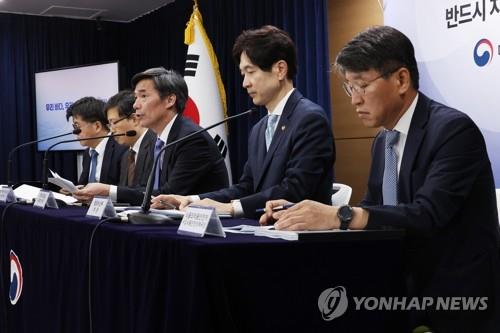- California Assembly OKs highest minimum wage in nation
- S. Korea unveils first graphic cigarette warnings
- US joins with South Korea, Japan in bid to deter North Korea
- LPGA golfer Chun In-gee finally back in action
- S. Korea won’t be top seed in final World Cup qualification round
- US men’s soccer misses 2nd straight Olympics
- US back on track in qualifying with 4-0 win over Guatemala
- High-intensity workout injuries spawn cottage industry
- CDC expands range of Zika mosquitoes into parts of Northeast
- Who knew? ‘The Walking Dead’ is helping families connect
S. Korea respects IAEA report on Fukushima wastewater discharge: official
The South Korea government respects the outcome of the International Atomic Energy Agency (IAEA)‘s safety review of Japan’s plan to release contaminated water from its crippled Fukushima plant, an official said Wednesday.
On Tuesday, the U.N. nuclear watchdog announced that its two-year review found Japan’s plan to release water from the plant into the sea to be consistent with its safety standards. The agency also said the treated water would have a negligible radiological impact on both people and the environment.
“It has been the government’s longstanding stance to recognize the IAEA as a prestigious internationally agreed-upon agency, and we hold respect for its findings,” said Park Ku-yeon, the first deputy chief of the Office for Government Policy Coordination, during a daily briefing.
Park also mentioned that efforts are under way to expedite the timeline for announcing the Seoul government’s own scientific report, which will be announced along with an in-depth analysis of the IAEA’s final report.
In addition to those reports, South Korea and the IAEA will conduct more sample tests on the Fukushima water and plan to produce a joint report later this year, according to the IAEA.
The tests will be carried out on samples stored in one of the tanks in the Fukushima nuclear power plant, by the IAEA’s Terrestrial Environmental Radiochemistry Laboratory and the Korea Institute of Nuclear Safety (KINS).
The government is currently in the final stage of conducting its own scientific analysis of the discharge plan. This analysis is based on the findings of an on-site inspection of the plant completed in late May, as well as expert analyses conducted by KINS since 2021.
It is largely expected that the results will be announced after IAEA Director General Rafael Mariano Grossi’s three-day visit to South Korea, which is scheduled for Friday, following his ongoing four-day trip to Japan.
Park said the government’s assessment of the IAEA report will be conducted separately from Grossi’s visit.
“Director General Grossi will come to South Korea and explain the contents that have already been announced,” Park said, emphasizing that Seoul’s analysis is a separate matter.
The director general is also scheduled to meet with the head of the country’s nuclear safety watchdog, the Nuclear Safety and Security Commission, as well as Foreign Minister Park Jin.
The results of the IAEA review are expected to provide further momentum to Japan’s intention to begin discharging the water from the plant, which was damaged by a massive earthquake and subsequent tsunami in 2011.
Despite continued opposition from neighboring countries, including South Korea and China, recent media reports suggested that Japan might commence the water release, estimated to span decades, as early as August.












